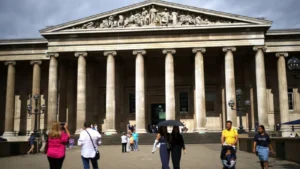Sindh, Pakistan: Pakistan’s supreme court backed the Sindh government in bulldozing homes of hundreds of people, legalising the eviction of thousands who live along narrow waterways – nullahs – that crisscross Karachi.
The verdict came as Bibi and hundreds of others held a protest outside the court. “We hoped that the court would ask the government not to make us homeless, but it did the opposite. Our children also protested on Sunday and urged the supreme court to stop demolition. It seems no one here cares for the future of the poor.”
At least 8,000 houses are being knocked down along the nullahs. The work, which began in February, is in response to the 2020 Karachi floods that saw choked up nullahs overflow and swamp the city. Improvements to Karachi’s water and sewage systems are being financed by the World Bank.
As many as 21,000 children would be out of school and living under the open sky
As people watched their homes being turned into rubble, civil society organisations approached the court to try to stop the evictions. They said the houses were not to blame for blocking the waterways.
But on Monday the supreme court rejected the petition.
While dozens of people told the Guardian they were renting their homes, the court said any leasing of land along the nullahs was illegal. Activists and writers have termed the decision “unjust”. Writer Fatima Bhutto, of the Bhutto political dynasty, tweeted: “The supreme court’s decision is a tragedy.”
Maqsooda Bibi, on right, attempts to keep cool during a protest in Karachi against the demolitions. Photograph: Shah Meer Baloch
In an editorial, Pakistan’s largest English-language daily, Dawn, said: “The demolition of houses situated within nine metres on either side of the Gujjar and Orangi nullahs will continue. When this exercise is completed (before this year’s monsoon, according to the plan), at least 100,000 people would perhaps have been rendered homeless. As many as 21,000 children would be out of school and living under the open sky.”
Bibi’s house was her family’s home for five decades. She shared it with four daughters and three sons-in-law. “We all started living on the lawn after they demolished our house but they will snatch the lawn now. At first, they took our shelter, now they will take our land,” she says.
Muhammad Shahid is a heart patient whose house was bulldozed a month ago. He expected justice from the court. He was at home when his house was bulldozed at around 11am one morning.
“We are helpless. Where should we go? We can’t die or live. I had my angiography done and now I can’t work. My children aren’t educated enough. My wife had a paralysis attack,” says Shahid. He says that even he has not got the 90,000 Pakistani rupees (£410) promised by the government.
Muhammad Shahid stands where two rooms belonging to him were bulldozed. Photograph: Shah Meer Baloch
Muhammad Aslam did receive some compensation for the loss of his house. But he says it is not enough. He says: “I want to return the amount because it is of no use for four families.” He lives with 28 others in one room and a tent after his two-storey house was bulldozed. “We are troubled in all ways, there is no gas or electricity or even sanitation. This isn’t living,” says Aslam.
Architect and urban planner Arif Hasan says the government had no “proper plan”. “They are not doing it merely to stop the flood but to make long roads along the nullahs connecting the Lyari expressway with the northern bypass, displace poor and benefit the rich.” He says the World Bank should denounce the Sindh government, as forced evictions are against the bank’s policies.
Muhammad Abid Asghar was one of the first to lose his home, on 2 February. With others, he established Gujjar Nala victims committee and, with activists of Karachi Bachao Tehreek (Save Karachi Movement), went to the Sindh high court.
Bulldozed and damaged houses in Gujjar nullah, Karachi, as the demolitions progress. Photograph: Shah Meer Baloch
After chalking slogans against the demolitions on walls around the city, the activists say they were called by the World Bank team for a meeting in April.
“We had believed the bank was funding the evictions, but the World Bank denied it. They assured us that no leased houses would be bulldozed.”
Sindh minister for information, Nasir Hussain Shah, also says the World Bank is not linked to the evictions. “The government will help residents in rehabilitation,” he says, adding that “not more than 5%” of residents were against the demolition works.






